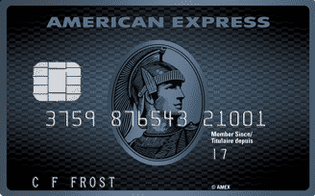The downside to this card is that a) it is an AMEX (which is not as well accepted as other places), and b) non bonused spend receives a 1% return. If you buy your travel on this card, you will get great travel insurance, but you will get a poor rate of return.
Introducing the American Express Cobalt Card
I was recently looking at the American Express Cobalt Card. It's a new card that was recently introduced. You earn Membership Rewards points for the following:
- 5 points per dollar spent on dining and grocery store purchases
- 2 points per dollar on gas station, travel purchases, and commuter / transit purchases (no other credit card offers 2% return on travel with all the insurance premiums).
- 1 point per dollar on everything else
What does one do with Membership Rewards (MR) points?
- Convert them at a 1:1 ratio with Air Canada's Aeroplan or Hilton HHonor's programs
- Convert them at a 1 : 0.75 ratio with Delta, British Airways, Etihad, Cathay Pacific, and Alitalia's frequent flyer points
- Convert them at a 1 : 0.5 ratio for Starwood Preferred Guest
- Convert them to gift cards at a 0.83% return (3000 MR points for a 25$ gift card -- a poor value)
- Buy toasters at an even worse value
- 15,000 points (max ticket value = 300$) for a select list of popular routes
- 20,000 points (max ticket value = 300$) for a travel to same or adjacent provinces/states
- 40,000 points (max ticket value = 700$) for North American travel
- 60,000 points (max ticket value = 900$) for European travel
- 100,000 points (max ticket value = 1,700$) for Asia/Pacific/Australia travel
- Or 1% back rebated to any other charged travel
This is potentially quite lucrative because it can be up to a 2c/point return on the popular YVR-YYC route (tickets are almost always above 300$ before taxes during times like Christmas). And if you earned 5 points per dollar spent at a restaurant, then that's potentially a 10% return.
The points earned on these airplane tickets themselves earn points, and they are not subjected to capacity controls.
I'm thinking about making the switch ...
